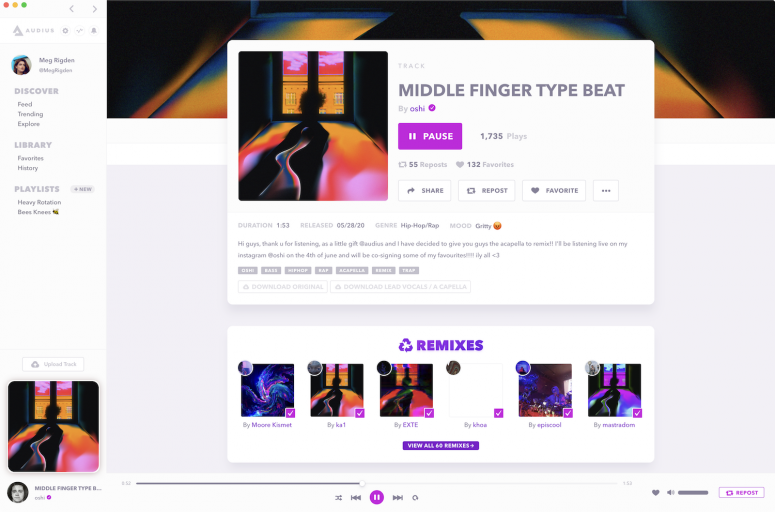Music is back on the blockchain.
Audius, a streaming service that connects music fans directly with artists, has raised $3.1 million in a strategic round co-led by Multicoin Capital and Blockchange Ventures, with participation from Pantera Capital and Coinbase Ventures.
Audius has now raised a total of $8.6 million as the platform prepares for prime time, having grown in less than a year to over 250,000 monthly users and 40,000 artists. EDM artists seem to be the site’s burgeoning specialty with notables including RAC, deadmau5, Lido, 3LAU, Zeds Dead, Mr. Carmack and REZZ all signed on.
The blockchain use case for music is a familiar one: the inequity and tardiness of the revenue model of streaming services like Apple Music and Spotify.
“It shouldn’t take a year and a half to get paid, and it’s just crazy that the people creating the music only take 12%,” Audius CEO Roneil Rumburg said in an interview. “After this extreme time delay, the artist just gets this check, so they don’t actually see who’s listening to them. There is no visibility because the artist doesn’t own their own data or their audience.”
The Audius P2P network allows artists to be paid in full by their fans, directly and instantly for every stream with the ability to cash out daily or hourly if they want, Rumburg added.
‘Fair trade’ but for music
Ethereum-based Audius picks up the mantle carried by ConsenSys-backed Ujo Music and groundbreaking projects like Imogen Heap’s Mycelia, which the artist described as “fair trade” music.
Indeed, folks such as Jesse Grushack, co-founder and CEO of the now-shuttered Ujo Music, have helped and advised Audius, as has Ujo’s former artist-in-residence, André Allen Anjos, better known by his stage name RAC, a Grammy Award winner who has remixed the likes of New Order, Lady Gaga and the Kings of Leon.
Anjos, who worked with Ujo for over a year and released an album on Ethereum, said the problem was the complexity of onboarding users.
“We used to kind of joke that it could take like 36 steps to get ether into MetaMask,” Anjos said in an interview. “Just to interact with these systems you needed to go through this crazy setup, and I think Ujo kind of suffered from that. But today, if you go to Audius it’s a pretty similar experience to any other platform, arguably better. That initial barrier to entry is not a problem anymore.”
Audius, which was founded in 2018 by Stanford University buddies Rumburg and Chief Product Officer Forrest Browning, has benefitted from “a kind of diaspora of talent that had already been working on this problem,” said Rumburg.
“Back in 2016, when these projects came about, was just really early,” he said. “The amount of stuff that [ConsenSys founder] Joe [Lubin] had to build from scratch was just this astronomical ask.”
The Audius team may have built the music player with a user interface that looks and feels like Spotify or SoundCloud, but it couldn’t be more different under the hood.
Decentralized streaming
The network consists of indexing nodes, which provide a discovery service, and content-posting or creator nodes. This intersection of fans, artists and infrastructure providers who host and index content (“stakers” in blockchain parlance), uses both the Ethererum public blockchain (which is where all the staking and look-up nodes are running) and a second, permissioned network where the uploaded content lives.
“It’s fully community-operated and hosted,” said Rumburg. “Today, if we shut down Audius, the company, all of this could keep working and keep running so long as the community wants to keep it up and running.”
Following on from a minimum viable product mainnet launch in the next couple of months, the next stage is to add instant payments for monetized content, which will use a system of stablecoins and be in place before the end of the year, said Rumburg.
“Payments will be done with a kind of stablecoin mechanism. So that’s not like an Audius native token, but a basket of third-party tokens. It’ll probably be a couple of the bigger ones,” he said. “We’re looking for good fiat to crypto on-ramp options. From the user’s perspective, they don’t even know this is happening. They just put in a credit card and top up that account and see a balance.”
The user interface for artists is just as simple, said Audius CPO Forrest Browning.
“As an artist, if you decide to monetize some of your content, your Audius dashboard might show you have $500 or whatever is your local currency, and with a one-click direct deposit you can pull that out, without knowing a stable token system was integrated,” Browning said.

Deep cuts
Music distribution on the internet has moved on since the time of Napster, but when an artist is signed to a label the label owns the rights to the artist’s master copies and gets to decide where that content is distributed. There seems to be more opportunity for negotiation these days, particularly between artists and forward-thinking independent labels.
“The majority of our usage right now is coming from independent artists who are not signed,” said Rumburg. “Those that are signed to progressive labels have gone and got permission from their label. I think the mentality is, the sooner you sign up to a system like this, the more following and momentum you build, similar to early accounts on SoundCloud or anything else like that.”
RAC, who is signed to iconic U.K. indie label Ninja Tune, said the conversation about him releasing an album on Ethereum back in 2017 was “very easygoing,” because the label is tech savvy.
“The way to go is obviously to ask the label for permission, but I feel like it would be a non-issue in most cases. I think most labels would say, ‘Why not?’ and just approach this as another distribution platform,” he said.
The leader in blockchain news, CryptoX is a media outlet that strives for the highest journalistic standards and abides by a strict set of editorial policies. CryptoX is an independent operating subsidiary of Digital Currency Group, which invests in cryptocurrencies and blockchain startups.




